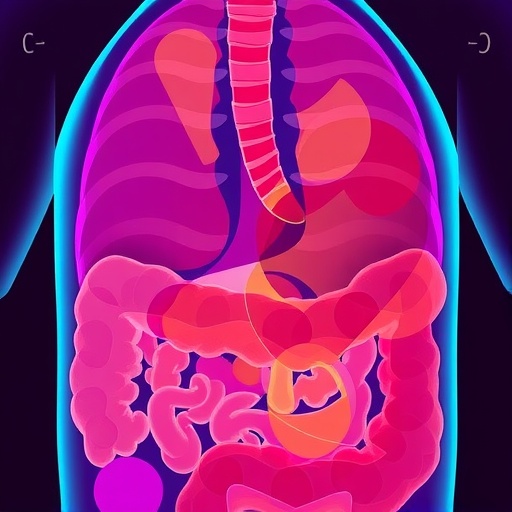In a groundbreaking study published in the journal BMC Cancer, researchers have unveiled a comprehensive analysis of the global burden of colorectal cancer (CRC) as of 2022, accompanied by projections extending to 2050. Leveraging data from the GLOBOCAN 2022 database, this investigation provides an in-depth understanding of CRC incidence and mortality across various world regions, illuminating critical demographic and socio-economic disparities shaping the disease’s trajectory. As colorectal cancer remains the second leading cause of cancer-related deaths worldwide, this research brings to light urgent public health imperatives and the need for tailored intervention strategies.
Colorectal cancer, a malignancy originating in the colon or rectum, continues to exert a formidable impact on global health, becoming increasingly prevalent in both developed and developing nations. According to the GLOBOCAN 2022 data, the world witnessed approximately 1.93 million new CRC cases alongside over 900,000 deaths attributed to the disease within the same year. These staggering figures underscore the vital necessity for enhanced preventive measures, earlier diagnosis, and more effective treatment protocols.
The study’s geographical analysis reveals a particular concentration of incidence and mortality within Eastern Asia, a region that reported the highest absolute numbers of new cases and fatalities. In China specifically, more than 517,000 new cases were diagnosed in 2022, with deaths surpassing 240,000. This regional burden is especially noteworthy given China’s rapid economic development and shifting lifestyle patterns, which are believed to contribute significantly to the rising CRC rates.
A striking aspect of the findings is the observed sex disparity in colorectal cancer epidemiology. Males consistently exhibited higher age-standardized incidence rates (ASIR) and age-standardized mortality rates (ASMR) compared to females across all regions examined, including within the Chinese population. This male predilection for CRC calls for further investigation into genetic, hormonal, and environmental factors that might underlie such differences and for gender-specific preventive strategies.
Age remains a crucial determinant in CRC risk, with incident cases and deaths markedly increasing after the age of 40. This age trend not only highlights the cumulative nature of carcinogenic exposure and genetic mutation but also underscores the potential utility of age-targeted screening programs aimed at early detection, which could substantially reduce mortality.
The study also vigorously explored the relationship between CRC burden and the Human Development Index (HDI), a composite measure of life expectancy, education, and income levels. Regions characterized by higher HDIs were found to experience elevated incidence and mortality rates of colorectal cancer, presumably reflecting lifestyle factors such as diet, obesity prevalence, and sedentary behavior, alongside better diagnostic capabilities and reporting accuracy.
Conversely, regions with low HDI scores exhibited comparatively lower CRC incidence and mortality, a pattern that may be influenced by underdiagnosis, as well as differing environmental and genetic risk factors. This disparity stresses the importance of improving cancer surveillance and healthcare infrastructure in less developed areas to accurately assess and address disease burden.
Projections based on a scenario assuming stable incidence rates from 2022 onwards indicated an alarming global increase in new colorectal cancer cases, expected to reach approximately 2.36 million by 2050. This represents a 22.51% increase, highlighting CRC as a growing public health concern that demands escalated preventive efforts and resource allocation.
Interestingly, the projections suggest a decline in new CRC cases within China, estimating a 10.27% decrease by 2050 under the constant incidence rate assumption. This anticipated trend may be attributed to ongoing public health campaigns, improvements in lifestyle factors, or the impact of screening, though it remains essential to monitor these assumptions closely.
The confluence of demographic factors including sex, age, and socio-economic status emerges as a critical framework to understand and combat colorectal cancer globally. The varied regional incidence and mortality illustrate that a one-size-fits-all approach is insufficient, and interventions must be contextually adapted to local epidemiological realities and healthcare capacities.
Prevention strategies must prioritize modifiable risk factors such as diet, physical activity, and smoking cessation, alongside robust screening programs targeted at high-risk populations. Additionally, increasing awareness and healthcare access in under-resourced regions will be pivotal in mitigating the projected rise in disease burden.
The study’s reliance on the GLOBOCAN database ensures that its findings are underpinned by the most comprehensive and current global cancer incidence and mortality data, enhancing their reliability and applicability in shaping future public health policies. However, researchers caution that continuous monitoring and data updates are vital to capture emerging trends and evaluate the effectiveness of interventions over time.
Colorectal cancer’s escalating global impact, as depicted by this study, highlights the urgency for coordinated international efforts involving governments, health organizations, and the scientific community. By fostering collaborative research, expanding screening initiatives, and addressing socio-economic disparities, it may be possible to curb the increasing toll of this disease and improve outcomes worldwide.
In conclusion, the global burden of colorectal cancer remains a formidable challenge characterized by complex demographic and socio-economic dimensions. The positive correlation between CRC incidence and mortality with the Human Development Index underscores the intricate interplay between development and disease epidemiology. This study offers critical insights that pave the way for targeted preventive measures, ultimately aiming to reverse the upward trajectory of colorectal cancer incidence and mortality projected through 2050.
Subject of Research: Global epidemiology, incidence, and mortality trends of colorectal cancer with future projections to 2050 based on GLOBOCAN data.
Article Title: Global burden of colorectal cancer in 2022 and projections to 2050: incidence and mortality estimates from GLOBOCAN.
Article References:
Wu, S., Zhang, Y., Lin, Z. et al. Global burden of colorectal cancer in 2022 and projections to 2050: incidence and mortality estimates from GLOBOCAN. BMC Cancer 25, 1770 (2025). https://doi.org/10.1186/s12885-025-15138-0
Image Credits: Scienmag.com
DOI: 10.1186/s12885-025-15138-0 (Published 14 November 2025)




